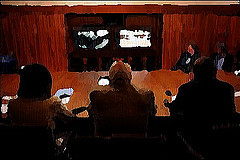
Paul McCartney Good Evening New York City. That was the second special ABC offered Thanksgiving night and this one actually was special.
"It was the biggest show we'd ever done, no one had ever done stadiums before," explained Paul about the Beatles performing in Shea Stadium 45 years ago on their historic American invasion tour. He was doing a sit down that was cut into his sharing memories of that performance at the concert to the audience.
Ask any singer who's ever been on stage and they will tell you the talking is the test. As long as you rush through the songs, you can usually hold the interest of the bulk of the audience but it requires a real artist, with charisma, to hold the audience's attention during spoken interludes. Few cry out "Sing 'Baby Love'!" while Diana Ross shares something with the audience or "Play 'Rosalita'!" while Bruce Springsteen's going into one of his spoken raps. The Bosses Diana and Bruce are legendary performers. So is Paul McCartney.
"Got To Get You Into My Life" had the stadium full of people on their feet, bouncing and singing along. We're sure it had that effect on many at home as well. Judging by remarks from friends with the network, ABC knew it had something as well, a real special.
It acknowledged the passage of time and did so in a way that wasn't maudlin or embarrassing. For example, with John Lennon, Paul wrote some of the defining songs of the sixties. Even more than any link to bandmates George Harrison or Ringo Starr, Paul is forever identified with John. On stage, he spoke of New York being John's town and introduced the low-key "Here To You" (from 1982's Tug of War) as a song with "the kind of stuff I never said to him" and "an imaginary conversation." Again, a low key song and seamlessly woven into the show as was the more high octane "Live And Let Die."
And as the audience went wild during the latter song, Paul did some of his best piano work in years. But even with this well known crowd-pleaser, Paul had still yet to play any of the nine US number one singles from his post-Beatles career (the theme to the James Bond film made it to number two) -- not to mention any of the Beatles' number ones. That's how well known his songs are.
"Okay, I wrote this next song for Linda," he declared. "She was a New York girl, she loved New York." And then the audience -- which had been singing along with every song before -- finally was served a number one, "My Love."
It was probably half-way through the acoustic guitar for "Yesterday" that we realized Paul now has the stature Frank Sinatra did back when the Beatles were active. Chairman of the Board. His voice is still tuneful but it is older and many of the songs are in a lower key. But, as with Frankie, the notes age may have robbed are overcome by the delivery experience has provided. When he sings, "There's a rain cloud hanging over me," he sounds like he believes it, he sounds like he means it and, like Sinatra, he sounds like he lived it.
We mentioned that to a friend on the phone while we watched the special and he immediately referenced an article -- him being the argumentative record producer that he is -- saying that couldn't be true because McCartney doesn't do standards.
The article was Steve Marinucci's interview with Peter Ames Carlin (author of Paul McCartney: A Life):
Q: Do you think Paul would ever do a torch song album and would it be successful?
Peter Ames Carlin: I don't, though I could be wrong about that. I guess I just haven't given it much thought. But why would Paul want to follow such a well-trod path, years/decades behind Rod Stewart, kd lang, Carly Simon, etc. etc. etc?
Our friend the producer thought this proved something. But, we pointed out, Paul's songs are standards. "Yesterday," for example is a standard, as is "Michelle" and many, many more. And Carly Simon did one of the first torch albums (1981's Torch) because these were the songs she grew up on, the ones she grew up loving. Paul's often recorded the songs he grew up loving, such as with 1991's Unplugged which contained "Be-Bop-A-Lula," "Blue Moon of Kentucky" and more.
The Beatles changed the business in many ways and one of the first ways was by writing much of their own material. It really wasn't done. And, when done, wasn't generally successful. The Beatles were the threat to the Brill Building school of songwriting. More so than Bob Dylan who, by 1964, was just another songwriter that Carole King, Gerry Goffin, Cynthia Weil, Barry Mann, Jeff Barry and Ellie Greenwich were competing with. (Bob wasn't climbing the charts in 1964 as a singer. His songs were being recorded by other acts, like Peter, Paul & Mary, who made them chart hits.) The Beatles did it all and did it from the moment America met them.
And what that really means is that today's Sinatra not only sings, he writes songs. Or maybe we were just high on the fact that our favorite solo career song got included in the special ("Band On The Run") or that he closed, at the piano, with "Hey Jude"?
But across the country, we're sure people were thinking similar thoughts on those songs or others. Like Sinatra before him, McCartney's provided a soundtrack to so many of our lives and offered so, so much more than "Silly Love Songs."
